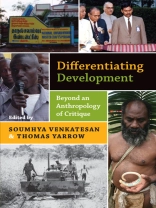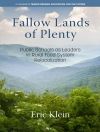Over the last two decades, anthropological studies have highlighted the problems of ‘development’ as a discursive regime, arguing that such initiatives are paradoxically used to consolidate inequality and perpetuate poverty. This volume constitutes a timely intervention in anthropological debates about development, moving beyond the critical stance to focus on development as a mode of engagement that, like anthropology, attempts to understand, represent and work within a complex world. By setting out to elucidate both the similarities and differences between these epistemological endeavors, the book demonstrates how the ethnographic study of development challenges anthropology to rethink its own assumptions and methods. In particular, contributors focus on the important but often overlooked relationship between acting and understanding, in ways that speak to debates about the role of anthropologists and academics in the wider world. The case studies presented are from a diverse range of geographical and ethnographic contexts, from Melanesia to Africa and Latin America, and ethnographic research is combined with commentary and reflection from the foremost scholars in the field.
Cuprins
Introduction. Anthropology and Development: critical framings
Thomas Yarrow and Soumhya Venkatesan
Part I: Anthropology and Development reconsidered
Chapter 1. On Text and Con-text: toward an anthropology in development
John Friedman
Chapter 2. Framing and Escaping: Contrasting Aspects of Knowledge Work in International Development an Anthropology
Maia Green
Intersection 1: Economies of Knowledge
Veena Das
Part II: Enacting Development
Chapter 3. The Progress of the Project: Scientific Traction in the Gambia
Ann Kelly
Chapter 4. Recursive partnerships in global development aid
Casper Bruun Jansen and Brit Ross Winthereik
Intersection 2: A Gift Back: the village and research
Annmarie Mol
Part III: Doing and Knowing
Chapter 5. Beyond an Anthropology of ‘the Urban Poor’: rethinking peripheral urban social situations in Brazil
John Gledhill and Maria Gabriela Hita
Chapter 6. Extraordinary Violence and Everyday Welfare: The State and Development in Rural and Urban India
Amita Baviskar
Intersection 3: the anthropology of development and the development of anthropology
Harri Englund
Part IV: the Promise of Progress
Chapter 7. Development, Participation, and Political Ideology in a Lebanese Town
Michelle Obeid
Chapter 8. Kastom Ekonomi and the Subject of Self-Reliance: differentiating development in Vanuatu
John P. Taylor and Benedicta Rousseau
Intersection 4: Modes of modernity
Norman Long
Part V: Forms and Effects
Chapter 9. Effecting Development and the Effects of Development: Bureaucratic Knowledges of Development in an Indian District
Nayanika Mathur
Chapter 10. The transformation of compassion and the ethics of interaction within charity practices
Catherine Trundle
Intersection 5: The art of balance, or else…
Alberto Corsín Jiménez
Despre autor
Thomas Yarrow lectures in Social Anthropology at Durham University. He is the author of Development Beyond Politics: Aid, Activism and NGOs in Ghana (Palgrave, 2011), and the co-editor of Archaeology and Anthropology: understanding similarity, exploring difference (Oxbow, 2010).












